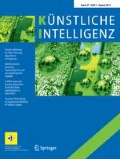Zusammenfassung
Hinweis der Herausgeber der KI-Zeitschrift: Je ein freies Rezensionsexemplare der Bände der DISKI-Reihe können bei den Herausgebern angefordert werden unter der Voraussetzung, dass eine Rezension anschließend für die KI-Zeitschrift geschrieben wird. Zu Umfang und Form von Rezensionen siehe die entsprechenden Autorenhinweise.
1 Vol. 330, Interactive Concept Description with Bayesian Partition Models
von Markus Müller (Promotion Otto-Friedrich-Universität Bamberg)
222 pp., softcover
ISBN: 978-3-89838-330-1
Preis: €50
Automotive companies are forced to extend and improve their product line-up continuously. However, increasing diversity, higher design complexity, and shorter development cycles can produce new and unforeseen quality issues. In order to plan and implement efficient remedial actions, automotive engineers have to understand the root cause of these manufacturing or design related problems. The analysis of quality data provides valuable insights at all stages of this iterative process of detecting and resolving quality issues.
Based on the practical requirements, a new, concept description approach, called interactive look-ahead decision trees, is developed. This approach combines interactive decision trees with Bayesian partition models and supports an interactive, iterative and intuitive way of causal investigation. The proposed method considers dependencies, in particular taxonomic and partonomic relationships among influencing variables and identifies the most likely, semantically meaningful partitions that are close to the concept that actually caused a quality issue. An evaluation on test data and real-world case studies illustrate how the approach can be used by engineers to investigate cause-effect relationships.
2 Vol. 329, Model-Based Transformations for Quantified Boolean Formulas
von Uwe Bubeck (Promotion Universität Paderborn)
223 pp., softcover
ISBN: 978-3-89838-329-5
Preis: €50
A popular approach for solving difficult decision problems in may areas, for example planning or verification, is to encode them as propositional formulas and to apply one of the powerful SAT solvers available today. Quantified Boolean formulas (QBF) generalize propositional logic by allowing universal and existential quantifiers over propositional variables. This permits very natural encodings which are often significantly more compact than their propositional counterparts, but also more difficult to solve.
The goal of this dissertation is to support effective use of quantification by examining close relationships between formula structure and quantifier expressiveness. Useful subclasses with lower complexity are considered, in particular Horn formulas and interesting generalizations thereof. From a theoretical and a practical point of view, this work presents efficient formula transformations and a preprocessing approach which allows the elimination of weak quantifiers from given QBF formulas in order to improve the performance of QBF solvers.
3 Vol. 328, Learning and Modeling with Probabilistic Conditional Logic
von Jens Fisseler (Promotion FernUniversität Hagen)
236 pp., softcover
ISBN: 978-3-89838-328-8
Preis: €50
Conditionals, also called if-then-rules, are a popular concept for knowledge representation. They have an intuitive semantics, and can also be annotated with probabilities, which, when combined with the principle of maximum entropy, yields a powerful formalism for representing uncertain knowledge. This book discusses several issues pertaining to probabilistic conditionals: learning them from data, and using them for modeling. The first part of this book presents the implementation of a method for learning probabilistic conditionals from data. In the second part, this learning technique is applied to the problem of fusing data originating from different sources. The third part is the focal point of the thesis. Here, an extension of propositional probabilistic conditional logic to a first-order probabilistic conditional logic is developed, and an approach to reduce the complexity of computing the maximum entropy model of a set of first-order probabilistic conditionals is devised.
4 Vol. 327, Knowledge Acquisition from a Collaboratively Generated Encyclopedia
Von Simone Paolo Ponzetto (Promotion Universität Stuttgart)
227 pp., softcover
ISBN: 978-3-89838-327-1
Preis: €50
Research in Natural Language Processing (NLP) has made tremendous progress in the last two decades by employing data-driven techniques. However, further major advances can be achieved by integrating linguistic, domain and world knowledge into statistical approaches. In this dissertation we present a methodology to extract this knowledge from Wikipedia. This resource has attracted the attention of much work in the Artificial Intelligence (AI) community, mainly because it provides semi-structured information and a large amount of manual annotations.
The proposed approach uses the category system in Wikipedia as a conceptual network. Semantic relations between categories are labeled to produce a large scale taxonomy. This resource is evaluated by comparing it with Cyc and WordNet, as well as through computing semantic similarity between words and using semantic similarity measures as features for a state-of-the-art coreference resolution system. The results show that this taxonomy can be successfully deployed for NLP tasks and represents a valuable semantic resource for AI applications.
5 Vol. 326, Model-based Failure-modes-and-effects Analysis and its Application to Aircraft Subsystems
von Alessandro Fraracci (Promotion Technische Universität München)
220 pp., softcover
ISBN: 978-3-89838-326-4
Preis: €55
Failure mode and effects analysis (FMEA) is a mandatory process during the design phase in the aeronautics/automotive industries: for each component of the equipment, all possible faulty states have to be analyzed and their impact on the function at different levels of hierarchy has to be described. It has to be repeated after design changes, consuming precious time of specialists.
The thesis describes a contribution to a European research project that joined research groups and aeronautics industries to produce a model-based system for automated FMEA.
Achievements: development of a formal model of the FMEA process; creation of a model library, using qualitative models rather than numerical ones; specification and implementation of a software module for generating qualitative models from numerical ones (Matlab models); validation, test, evaluation of the abstraction operator and library for a test case of the project.
Informationen und Vorlagen für Autoren: http://www.aka-verlag.com/loadtop/load.php?isbn=diski
Author information
Authors and Affiliations
Corresponding author
Rights and permissions
About this article
Cite this article
Hertzberg, J. Neue Bücher in der Reihe DISKI: Dissertationen zur Künstlichen Intelligenz Editor-in-Chief: Wolfgang Bibel. Künstl Intell 25, 85–86 (2011). https://doi.org/10.1007/s13218-011-0087-x
Published:
Issue Date:
DOI: https://doi.org/10.1007/s13218-011-0087-x

